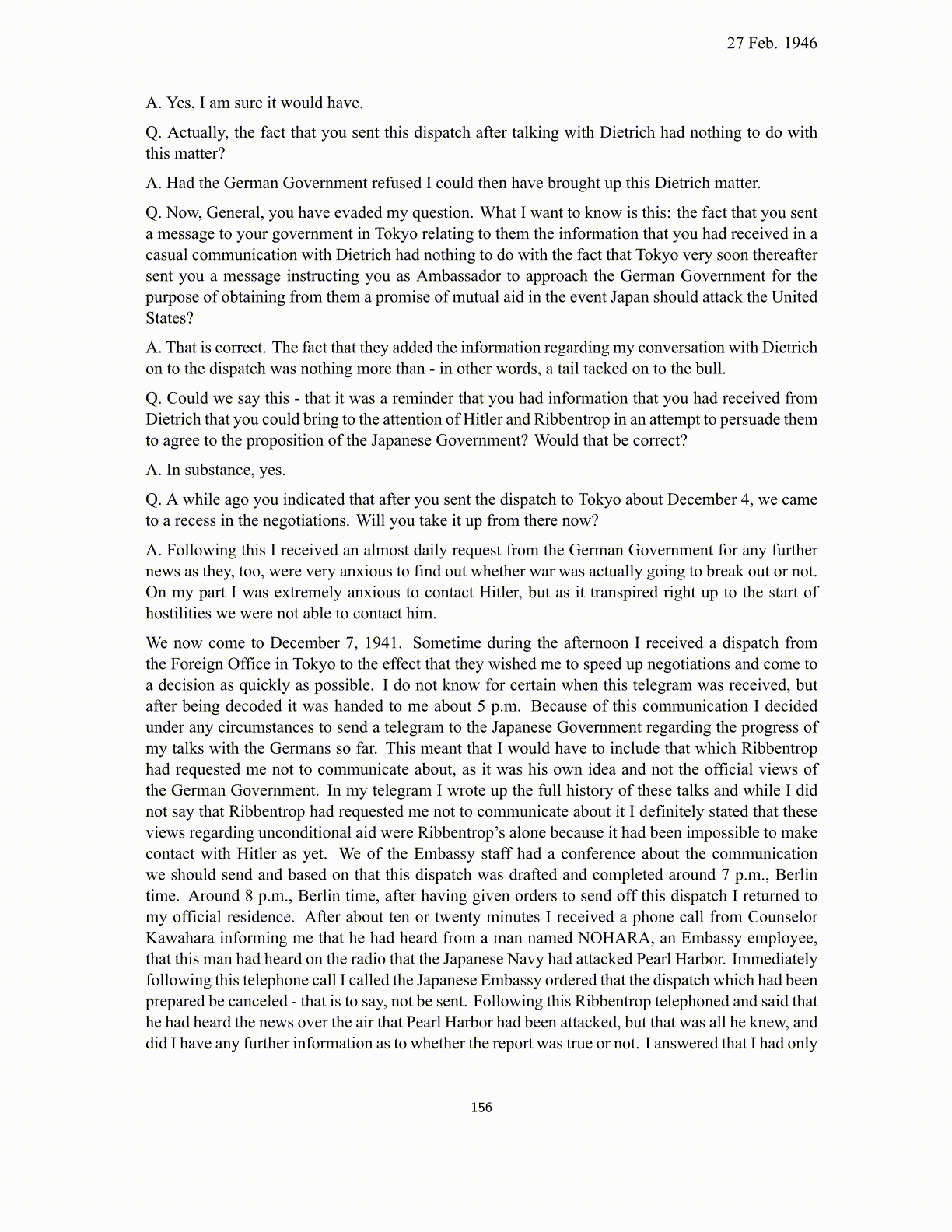
27 Feb. 1946 A. Yes, I am sure it would have. Q. Actually, the fact that you sent this dispatch after talking with Dietrich had nothing to do with this matter? A. Had the German Government refused I could then have brought up this Dietrich matter. Q. Now, General, you have evaded my question. What I want to know is this: the fact that you sent a message to your government in Tokyo relating to them the information that you had received in a casual communication with Dietrich had nothing to do with the fact that Tokyo very soon thereafter sent you a message instructing you as Ambassador to approach the German Government for the purpose of obtaining from them a promise of mutual aid in the event Japan should attack the United States? A. That is correct. The fact that they added the information regarding my conversation with Dietrich on to the dispatch was nothing more than - in other words, a tail tacked on to the bull. Q. Could we say this - that it was a reminder that you had information that you had received from Dietrich that you could bring to the attention of Hitler and Ribbentrop in an attempt to persuade them to agree to the proposition of the Japanese Government? Would that be correct? A. In substance, yes. Q. A while ago you indicated that after you sent the dispatch to Tokyo about December 4, we came to a recess in the negotiations. Will you take it up from there now? A. Following this I received an almost daily request from the German Government for any further news as they, too, were very anxious to find out whether war was actually going to break out or not. On my part I was extremely anxious to contact Hitler, but as it transpired right up to the start of hostilities we were not able to contact him. We now come to December 7, 1941. Sometime during the afternoon I received a dispatch from the Foreign Office in Tokyo to the effect that they wished me to speed up negotiations and come to a decision as quickly as possible. I do not know for certain when this telegram was received, but after being decoded it was handed to me about 5 p.m. Because of this communication I decided under any circumstances to send a telegram to the Japanese Government regarding the progress of my talks with the Germans so far. This meant that I would have to include that which Ribbentrop had requested me not to communicate about, as it was his own idea and not the official views of the German Government. In my telegram I wrote up the full history of these talks and while I did not say that Ribbentrop had requested me not to communicate about it I definitely stated that these views regarding unconditional aid were Ribbentrop’s alone because it had been impossible to make contact with Hitler as yet. We of the Embassy staff had a conference about the communication we should send and based on that this dispatch was drafted and completed around 7 p.m., Berlin time. Around 8 p.m., Berlin time, after having given orders to send off this dispatch I returned to my official residence. After about ten or twenty minutes I received a phone call from Counselor Kawahara informing me that he had heard from a man named NOHARA, an Embassy employee, that this man had heard on the radio that the Japanese Navy had attacked Pearl Harbor. Immediately following this telephone call I called the Japanese Embassy ordered that the dispatch which had been prepared be canceled - that is to say, not be sent. Following this Ribbentrop telephoned and said that he had heard the news over the air that Pearl Harbor had been attacked, but that was all he knew, and did I have any further information as to whether the report was true or not. I answered that I had only 156